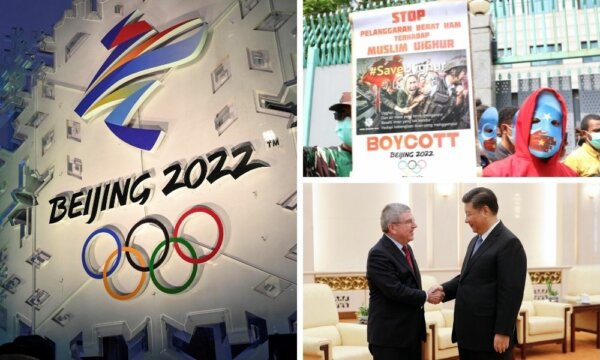
The Winter Olympics get underway amid a chorus of criticism and tough questions for the International Olympic Committee. With human rights, commercial concerns and diplomatic boycotts dominating proceedings, China’s polarising Games present the sternest of tests for the Olympic brand.
If Thomas Bach had been expecting Tokyo 2020 to be the last Olympic Games of his tenure to be dominated by controversial circumstances he has been soundly mistaken.
Speaking during the summer Games’ closing ceremony last August, the International Olympic Committee (IOC) president looked back on an “unprecedented” event, one which had been spent largely battling the lingering presence of Covid-19. Bach also made sure to champion the “powerful message of solidarity and peace” he claimed had been forged by the Tokyo Olympics.
On the eve of Beijing 2022, however, such displays of solidarity have been lacking.
The pandemic, clearly, remains a pressing concern for organisers of the upcoming Winter Olympic and Paralympic Games, which were awarded to China back in 2015. The emergence of the Omicron variant even forced the IOC to rule out postponing an event for which tickets will not be on sale to the general public. The Lausanne-based organisation may have been granted its wish for coronavirus not to overshadow the buildup to Beijing 2022. The reasons for that, however, are of no less concern.
Outrage over the ongoing persecution of Uyghur Muslims in Xinjiang, which a US state department report described as genocide, has been matched by the disbelief over the IOC’s failure to address such atrocities. China’s actions in Tibet and Hong Kong, coupled with concerns for the welfare of tennis player Peng Shuai, have also attracted a deluge of criticism from across the globe, with some countries – including the US, the UK and Canada, as well as Australia, Lithuania and Denmark – even announcing a diplomatic boycott of the Games.
The IOC’s silence has been deafening. But the noise around China’s human rights record cannot be ignored. Bach’s belief that the Olympic Movement is a force for good is being heavily tested. If recent form is anything to go by, the IOC will stand by its apolitical stance. Doing so has the potential to do significant damage to the Games and all that goes with it.
Still, though, when proceedings get underway on 4th February, the Chinese capital will become the first city ever to host both the Summer and Winter Olympic Games, having previously staged the former in 2008. Around 3,000 athletes from 90 nations will compete in a total of 109 events, which will be held across 13 venues, split between the zones of Beijing, Zhangjiakou and Yanqing.
Human rights, diplomatic boycotts and Covid-19 might have dominated the buildup but, as is increasingly the case, the IOC will be hoping that the performances of the Olympians at the Games can once again distract from the controversy
At a media briefing held by Human Rights Watch (HRW) last month, the organisation’s China director Sophie Richardson painted a sobering scene when discussing the human rights violations that have taken place under the country’s president Xi Jinping.
“These are atrocity crimes, they are among the most serious under international law, and they should give everyone pause about engaging in any sort of activity that lends any political credibility to this government,” said Richardson. “I think people also need to be aware that freedom of expression inside China is absolutely on the ropes.”
She continued: “There is nothing resembling the rule of law inside China. The party uses the legal system as an instrument to maintain its political power. Maybe the best way to make this more comprehensible to people is to know that only a tiny minority of criminal defendants, for example, have any sort of legal defence at all, and the conviction rate remains 99 per cent. It is explicitly stipulated that the legal system serves the party’s interests.
“One of Xi Jinping’s clear goals over the last several years has been to prosecute, persecute, detain, disappear and or drive into exile independent civil society activists.”
Richardson would also refer to China as an “Orwellian surveillance state”, a looming presence that she says prevents people from engaging in certain conversations the government does not deem palatable.
At the centre of China’s desire to host the Winter Olympics is, according to HRW, sportswashing – a chance for the country to scrub out its human rights record with the glamour and appeal of one of the world’s biggest sporting events.
China wouldn’t be the first to do so. Sportswashing has been levied at other regimes and state-backed investment funds alike in recent years. But in an era where close scrutiny over social responsibility is increasingly prevalent, the decision to award China hosting duties feels all the more uncomfortable and something stakeholders cannot turn a blind eye to.

Be the first to comment